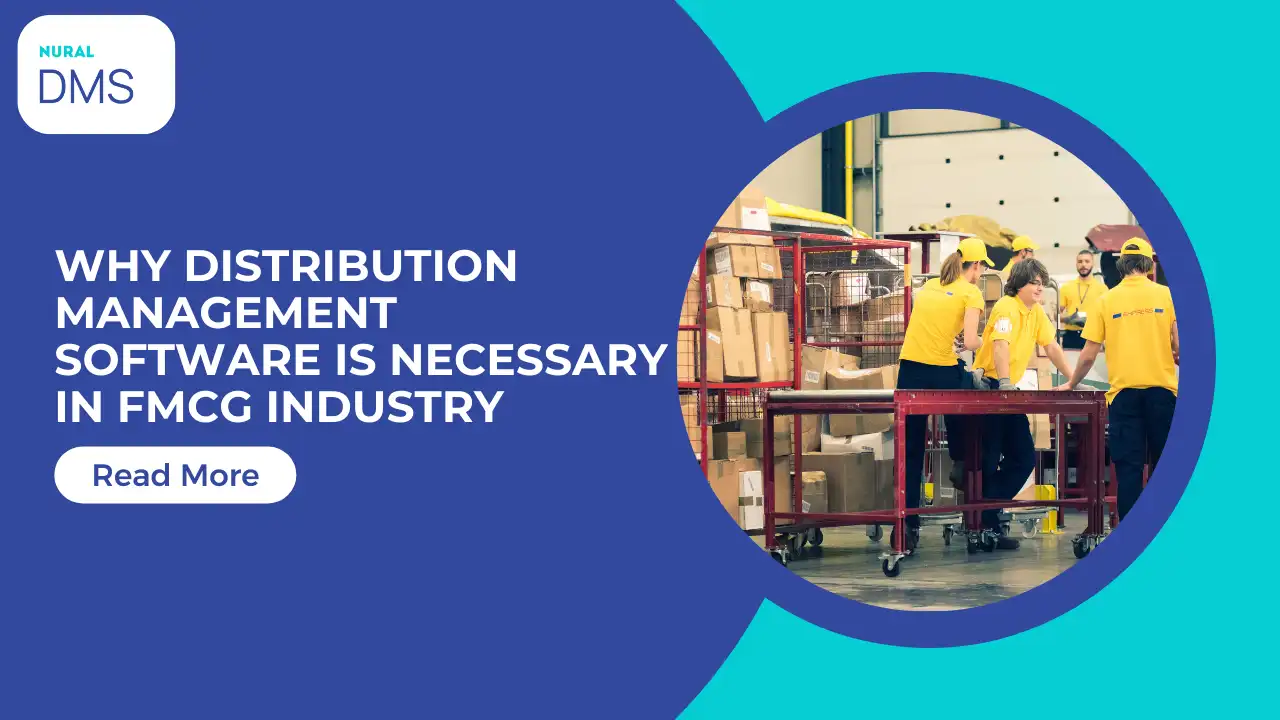
- Simplifying FMCG Distribution: An Introduction to Distribution Management system
- Many FMCG Companies Started Using FMCG Distribution Management Software
- Impact of a Distribution Management System in FMCG Industry
Key Takeaways:
- FMCG Distribution Management System’s various KPI dashboards and demand-supply analyses aid decision-making and forecasting.
- FMCG DMS gives distributors access to data-driven insights, enabling them to manage their inventory more efficiently with minimal expenditure.
- Tax computation is a time-consuming job for distributors. A full-featured FMCG DMS eliminates this problem.
Companies must overcome several ground-level hurdles to get their items on the right shelf at the appropriate time as market dynamics change. One method to accomplish this is to increase your network’s traction with distributors, major stockists, and intermediaries. The Distribution Management System (DMS) aids in supervising the supply chain by administering promotions, invoices, inventory, and numerous distributor claims.
Since organizations still use manual inventory monitoring tools, sales billing handbooks, and other outdated methods, this army of channel partners requires the newest tools and technologies before any other supply chain players.
Many FMCG Companies Started Using FMCG Distribution Management Software
Many domestic and MNC firms have recently switched to a more comprehensive and open Distribution Management System to address these issues. Such a system
- facilitates all distribution processes and activities
- enhances supply chain efficiency
- avoids stock-outs and overstocking
- gives businesses access to real-time data from distributors
The DMS software is the link between manufacturers and retailers. Its primary function is to control the flow of products from the firm’s suppliers and producers to the customers of the company. The solution to controlling goods delivery from sales orders to invoicing to claims. FMCG firms are excited about distribution management systems, but implementing them across their partner network is difficult.
Impact of a Distribution Management System in FMCG Industry
A DMS software streamlines supply channel operations. Brands and distributors see instant benefits.
Data Authenticity with Distribution Management System
Distributors continue to manage their records using a format and principles established by their forefathers and fundamental computing. This method needs to be more convenient and error prone. A distribution management system is an automated instrument for keeping track of orders, claims, invoices, and stock information, among other things. It provides precise, verified data to assist distributors in deciding what to stock, how many claims are pending, and how many orders are unfulfilled.
Distribution Management system also help to Decision Making in Real Time
The Distribution Management System’s various KPI dashboards and demand-supply analyses aid decision-making and forecasting. Also, it obtains in-stock statements, creditor limits, and stock reorders.
DMS lets marketers customize retail channels and classes and regulate pricing and patterns. With real-time fulfillment data, they can increase outlet penetration by deploying the correct schemes to all channel partners. ML-based Modules are the most innovative method for companies always to have inventory.
Using Distribution Management Software helps increase sales
As it speeds up operational operations, a DMS can enhance sales. Distributors boost their sales by analyzing the data provided, such as KPI trends, demand trends by zone, etc.
Brands gain a unified Demand Capture and Execution cycle for business continuity. Real-time Price and Scheme visibility lets them grab demand ten times quicker. Rapid Claim Settlement facilitated by agile and robust workflows helps distributors increase their liquidity and, consequently, their stock levels.
Using distribution management software also helps reduce cost and time
A distribution system includes stages such as challan generation, order confirmation, billing, etc. Appointing personnel for each phase can increase working capital costs. A DMS that acquires automated data decreases cost and time at multiple stages to minimize escalating capital costs and streamline distribution.
Effective inventory management with the help of distribution management software
A decent DMS gives distributors access to data-driven insights, enabling them to manage their inventory more efficiently with minimal expenditure. It helps distributors reduce returns and increase earnings by showing batch-wise, real-time stock aging. It integrates secondary sales orders directly with Distributors to maximize fulfillment vs. store demand and ensure sufficient stock.
DMS App Helps with Automated Tax Compliance
Tax computation is a time-consuming job for distributors. A full-featured DMS eliminates this problem. It generates proper invoices using pre-configured Tax Compliance standards. Distributors handle returns using e-invoicing and e-way.
Increase coverage in rural areas with the help of Distribution management software
A DMS is ideal for distributors willing to purchase a computer capable of running the application. This is because most DMS systems necessitate an internet connection to synchronize individual app data with the primary database and provide real-time brand visibility. But what can businesses do in rural and remote areas where mobile phones are the only affordable devices for distribution partners?
A distribution management system helps distributors and FMCG firms strengthen partner relationships and promote transparency and ownership in a large nation like India. Nural’s DMS ia an innovative solution that helps brands gain visibility on their extended distribution channels. It helps rural sub-stockists with Goods Receipt, Inventory Management, Van Booking, Billing, and Purchase Order requests.
We’d Love To Hear From You!
Drive Business Growth with Nuraltech
Empower your sales, distribution & analytics with data-driven SaaS solutions.
Schedule a Demo



